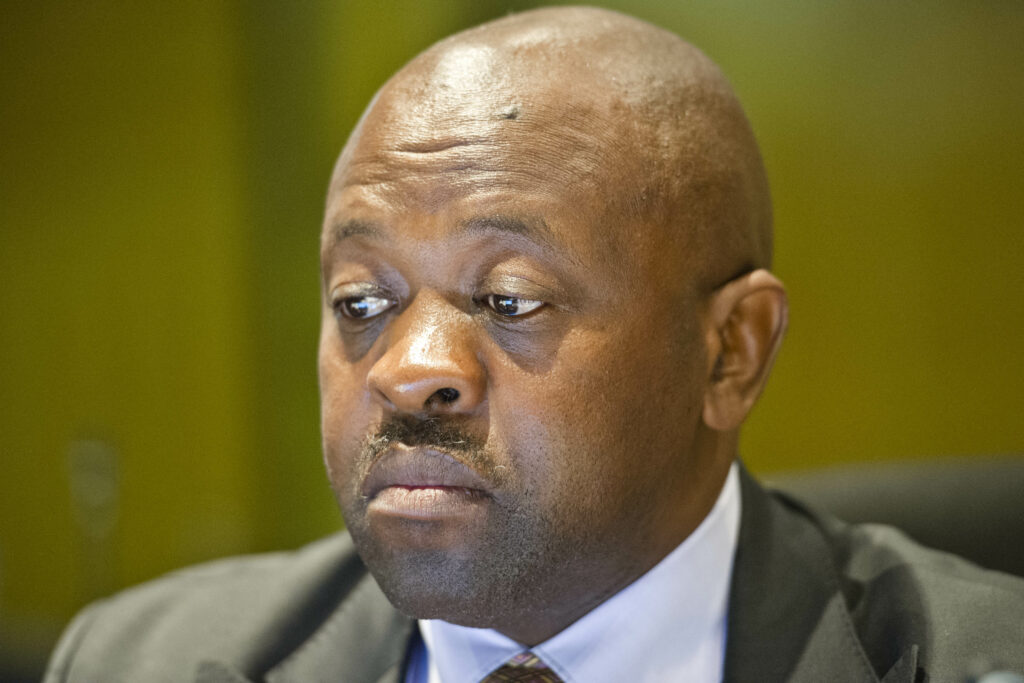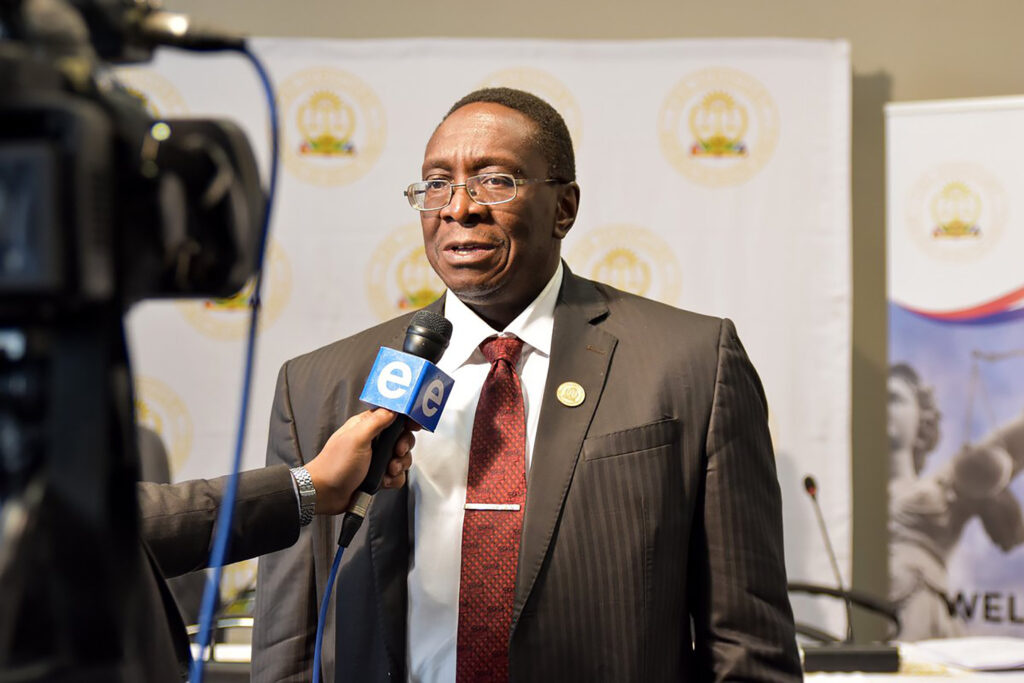Raymond Zondo. (Veli Nhlapo)
The public interviews are only days away and, for the first time, four exceptional candidates are in the running for the top post in the country’s judiciary. Each has qualities that might boost their chances of getting the job, and those that might weaken them. But what qualities does a modern chief justice need?
Over the past century, the role of the chief justice has evolved from being a largely ceremonial head of the apex court to being the head of the large, complex institution that is South Africa’s modern judiciary.
The chief justice must be an intellectual leader of the constitutional court, which deals with weighty, complex issues, and produces high-quality judgments. The chief justice needs a reputation of utmost integrity and ethical conduct to foster ethics among judges and enforce the Judicial Code of Conduct.
The chief justice needs administrative skills to manage the apex court and the other institutions in the judiciary such as the Judicial Service Commission (JSC).
The chief justice needs an independent mind, with a demonstrated commitment to the Constitution’s values of equality, dignity, freedom and human rights. The chief justice needs to be the judiciary’s chief diplomat, able to speak for the judiciary to promote the administration of justice, enhance the reputation of the judiciary and affirm the rule of law.
 Mbuyiseli Madlanga. (Photo by Gallo Images / Foto24 / Craig Nieuwenhuizen)
Mbuyiseli Madlanga. (Photo by Gallo Images / Foto24 / Craig Nieuwenhuizen)Justice Mbuyiseli Madlanga
Why he might get the nod
Madlanga has an impressive track record of written judgments, which suggests that he would be a strong intellectual leader. His New Nation Movement judgment confirmed that independent candidates may run for office at national level. In the Corruption Watch case he set aside former National Prosecuting Authority boss Mxolisi Nxasana’s R14-million “golden handshake” by then president Jacob Zuma, and declared advocate Shaun Abrahams’s appointment as NPA boss to be unlawful. The Daniels v Scribante judgment is a seminal treatment of the court’s approach to the land question. Madlanga has also published widely on the interplay of business and human rights, judicial ethics and constitutionalism, and is editor of the South Africa Judicial Education Institute journal.
He has held visiting professorships at universities locally and abroad. As a judge of the constitutional court since 2013, he has experience of the operations of the highest court. In recent times, he has been the presiding judge in many hearings, and seems to command the respect of his colleagues. He is due to retire in 2025.
Why he might not make the cut
Madlanga has significantly less formal leadership experience than any of the other candidates, having never held a permanent judicial leadership position. It might be believed that his administrative skills are of an unknown quantity. And it might be that it is necessary to appoint a chief justice who is able to serve for a longer period. The tenure of former chief justice Mogoeng Mogoeng lasted for 10 years. Madlanga would serve just over three years.
 Mandisa Maya. (Photo by Gallo Images / Sunday Times / Alon Skuy)
Mandisa Maya. (Photo by Gallo Images / Sunday Times / Alon Skuy)Justice Mandisa Maya
Why she might get the nod
The first clue is in the “she”. There is a view for the next chief justice to be a woman — there has never been a female chief justice in South Africa’s history. As the president of the supreme court of appeal since 2017 and deputy president of the SCA since 2015, she has a track record of heading a busy court and has a reputation of high performance. Fellow SCA judges have spoken of how Maya successfully led the SCA through a difficult transition where it had to deal with racial and gender hostilities among the judges, including including allegations of bullying.
Maya is also credited with being innovative, having led the transition to online hearings when the country was under hard lockdown. And despite the extent to which the judiciary has been drawn into political controversies in recent years, Maya appears to have kept her nose clean and would be seen as a politically safe choice. She also satisfies the diplomacy criterion, having been elected the West/Southern Africa regional director of the International Association of Women Judges. Maya would also not have her time as chief justice restricted by term limits.
Why she might not make the cut
Maya served as an acting judge of the constitutional court in 2012. Although she has previously been a candidate for appointment, she has never served as a permanent judge of that court. By convention, the leader of the judiciary is drawn from the highest court, and there may be a view that it would not be healthy for the collegiality of the court — and a lack of continuity and institutional knowledge at the apex court — to bring in a judge from outside.
 Dunstan Mlambo
Dunstan MlamboJudge President Dunstan Mlambo
Why he might get the nod
Mlambo has impeccable credentials as a judicial leader. He has served as judge president of two of the busiest courts in the country — the labour court and the Gauteng high court – and is highly regarded by the legal profession as an innovative and savvy leader. The Gauteng high court is the only court system that operates a virtual case management system.
He is also a jurist of some standing, having served as a judge of the SCA for several years before moving into judicial leadership. He also fits the diplomacy criterion, having represented South Africa’s judiciary abroad, including currently serving as Africa Chapter president of the International Association of Refugee and Migration Judges. As with Maya, he will be able to serve a lengthy term.
Why he might not make the cut
The Gauteng high court has been at the centre of many politically controversial cases, and Mlambo has sat on many of them, because it is a convention for judicial leaders to take the responsibility for hearing the most high-profile cases. This may have the unfair consequence of being seen as a politically controversial appointment.
Mlambo has until this year not acted as a judge of the constitutional court, much less served as a permanent judge of the court. So he too might be seen as an “outsider”.
Acting Chief Justice Raymond Zondo
Why he might get the nod
Continuity. Having served as Mogoeng’s deputy for the past four years, it would be a logical transition for Zondo to take over the top job — although there is no automatic practice of the deputy succeeding the chief justice, as the confounding failure to appoint Justice Dikgang Moseneke on multiple occasions shows.
Zondo is one of the most prolific authors of constitutional court judgments, having written 57 since he joined the court in 2012. He also has significant leadership experience, having been the long-time judge president of the labour court and the labour appeal court. His October 2021 chairing of the JSC interviews has also earned him some plaudits, with commentators noting the dignified yet rigorous way the interviews were conducted.
His recent chairing of the state capture commission appears to have made him something of a hero as the face of the fight against corruption and bad governance.
Why he might not make the cut
Most of the factors listed above also potentially work against him. Many concerns about the running of the labour court were expressed during the JSC sitting in April 2010, at the end of his tenure heading that court. This may call the strength of his administrative skills into question. Similarly, questions may be asked about the many delays that have beset the state capture commission.
The commission’s work has also made Zondo unpopular in some political quarters, particularly regarding the saga of former president Jacob Zuma’s refusal to testify. This may cause Zondo’s appointment to be seen as too politically contentious.
But perhaps most pertinent is that Zondo has only about two years left of his tenure as a constitutional court judge before he has to retire. There is some precedent for a short stint as chief justice — Justice Sandile Ngcobo served for just under two years. But it may be felt that it would be preferable to select a candidate who will have more time to implement their vision for the judiciary.
The JSC interviews
All four candidates will be interrogated about their vision for the judiciary in the JSC interviews from 1 to 5 February. The JSC has recently not covered itself in glory when it comes to how it conducts interviews. We hope that lessons have been learnt and systems of improvement have been put in place, chief among which is a clear set of criteria to ensure fairness to all candidates.